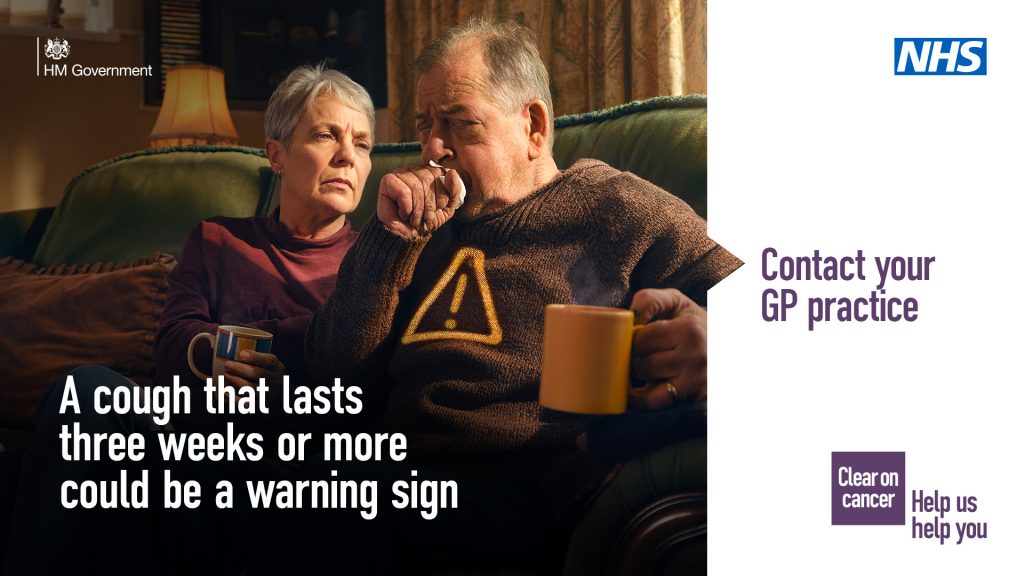
Lung cancer GP referrals have been the slowest of all cancer types to recover since the start of the pandemic, so the aim of this lung cancer activity is to raise awareness of the key symptom of lung cancer – a cough that lasts for three weeks or more. The campaign is encouraging those who have this symptom to contact their GP practice, reminding the public that the NHS wants to see them.
When cancer is diagnosed early, treatment is more likely to be successful. However, there is a lack of awareness that a persistent cough on its own can be a sign of lung cancer, and a need to remind the audience to act on a persistent cough and not wait to see if it resolves.
The campaign targets men and women over the age of 60, as this age group are more at risk of lung cancer, particularly those from C2DE socio-economic groups as they are often more reluctant to visit their GP. This will also target friends and family members to ensure they are clear on the symptoms and can encourage loved ones to contact their GP practice if they have had a cough lasting three weeks or more.
- If you’ve had a cough for three weeks or more, it could be a warning sign
- A cough for three weeks or more could be a sign of cancer. Contact your GP practice
- It’s probably nothing serious, but finding cancer early makes it more treatable
- Your NHS wants to see you
- If a friend or family member has been coughing for three weeks or more, encourage them to contact their GP practice
- In addition to the symptom of a cough for three weeks or more, other symptoms of lung cancer include:
- Chest infections that keep coming back
- Coughing up blood
- A long-standing cough that gets worse
- An ache or pain when breathing or coughing
- Persistent breathlessness
- Persistent tiredness or lack of energy
- Loss of appetite or unexplained weight loss
- Early diagnosis and treatment of cancer can save lives
KEY FACTS AND STATISTICS
- Lung cancer GP referrals have been the slowest of all cancer types to recover since the start of the pandemic
- Lung cancer is the third most common cancer in England with around 39,990 cases diagnosed each year. About 89% of those are aged 60 and over
- Lung cancer is England’s biggest cause of cancer death. In 2021, around 26,400 people died from lung cancer in England
- In 2019, lung cancer accounted for 12% of all cancer diagnoses in England and 20% of all cancer deaths
- Five-year survival for persons diagnosed with stage 1 lung cancer is 61% compared with just 4% for those diagnosed with late-stage (stage 4) lung cancer
- Between 1995 and 2019, age-standardised incidence rates of lung cancer have increased from 50.8 per 100,000 to 67.1 per 100,000 for females. In males, age-standardised incidence rates of lung cancer have decreased from 126.6 per 100,000 to 84.9 per 100,000
- Between 2001 and 2019, age-standardised mortality rates of lung cancer have remained relatively stable between 44.7 per 100,000 and 43.4 per 100,000 for females. In males, age-standardised mortality rates of lung cancer have decreased from 95.7 per 100,000 to 61.5 per 100,000
AGE-RELATED RISK
- The incidence of lung cancer increases with age: 89% of cases are diagnosed in those aged 60 and older
LUNG CANCER DIAGNOSIS
- In 2021, 35.5% of all cancers in England were diagnosed via an emergency presentation. Those diagnosed through emergency presentations are often at an advanced stage, resulting in poorer survival.
OTHER
- More than four in 10 cases of cancer could be prevented, primarily through lifestyle changes such as not smoking, keeping a healthy body weight, eating a healthy balanced diet and cutting down on alcohol
